nation
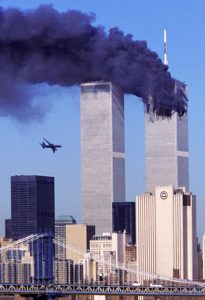
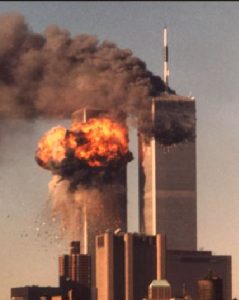 Looking back now, back to a time before the September 11, 2001 attacks, our nation had a very different feel…innocent maybe, but we had no reason to feel a lack of security. Then came that horrific day in September, when innocence was lost. Our nation was attacked…on our own soil, and that was not acceptable!! Of course, there would be retaliation. Those responsible would have to pay, and they did, but we also had to find a way to make sure this could never happen again.
Looking back now, back to a time before the September 11, 2001 attacks, our nation had a very different feel…innocent maybe, but we had no reason to feel a lack of security. Then came that horrific day in September, when innocence was lost. Our nation was attacked…on our own soil, and that was not acceptable!! Of course, there would be retaliation. Those responsible would have to pay, and they did, but we also had to find a way to make sure this could never happen again.
Enter the Office of Homeland Security. Founded on October 8, 2001, less than one month after the September 11th terrorist attacks…the hope was to be able to decipher the chatter that is always out there and if possible, stop any future attacks. While we would all agree that Homeland Security hasn’t done its job in the way we would like, there have been no major attacks on our soil. Any further inaction on their part could cause big problems, so we need to watch and pray over our nation.
Homeland Security is a department of the cabinet. It is the largest department of the federal government, charged with preventing terror attacks, border security, immigrations and customs, disaster relief and prevention and other related tasks. President George W Bush announced the creation of a new office to 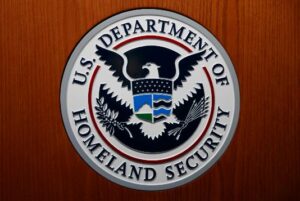 “develop and coordinate the implementation of a comprehensive national strategy to secure the United States from terrorist threats or attacks” just ten days after September 11. The new director of the Department of Homeland Security (DHS), Tom Ridge assumed his role as director and the office opened on October 8, 2001.
“develop and coordinate the implementation of a comprehensive national strategy to secure the United States from terrorist threats or attacks” just ten days after September 11. The new director of the Department of Homeland Security (DHS), Tom Ridge assumed his role as director and the office opened on October 8, 2001.
Congress had their concerns about the new department, thinking it would add to the federal bureaucracy and dramatically re-organize the security state. Nevertheless, Congress officially voted to make the office a cabinet-level department in November of 2002. Eventually, 22 other departments were absorbed by DHS. Entities absorbed by DHS included the Secret Service, Customs and Border Protection, and even Coast Guard. The Department of Homeland Security has faced criticism for much of its brief history. It doesn’t really seem to be a very “well-oiled machine” as it were. The response to Hurricane Katrina, for example, was condemned by many, despite having been partly founded to coordinate a government-wide disaster response. Unfortunately, DHS reportedly did not develop such a plan until two days after Katrina made landfall…great timing, since they knew the hurricane was coming.
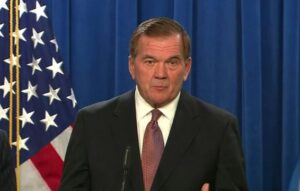
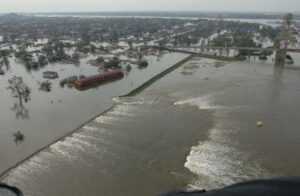
The DHS is inefficient in many ways, but I suppose that any government agency is…especially these days. Nevertheless, one thing can be said for them…up to now anyway. There has not been a major attack on American soil since they were formed. So, provided they continue to do that much, they are better than no security at all.
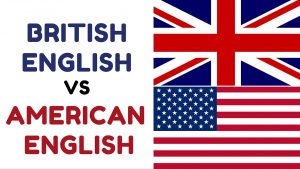 When the colonists left England to form America, they were like the younger sibling, at least when it came to language and much of how they ran the country. Nevertheless, like that younger sibling, things began to change pretty quickly. Part of the change was due simply to distance. When you don’t hear a language all the time, you begin to vary in your own speech. I didn’t really realize there was such a difference between American English and British English, other than the accent of course. Still, I noticed that more and more forms were asking which of the two I spoke. I always thought that it was an odd question, because English is English…right? Well, the correct answer is…wrong!! And when I thought about it, I knew that to be true.
When the colonists left England to form America, they were like the younger sibling, at least when it came to language and much of how they ran the country. Nevertheless, like that younger sibling, things began to change pretty quickly. Part of the change was due simply to distance. When you don’t hear a language all the time, you begin to vary in your own speech. I didn’t really realize there was such a difference between American English and British English, other than the accent of course. Still, I noticed that more and more forms were asking which of the two I spoke. I always thought that it was an odd question, because English is English…right? Well, the correct answer is…wrong!! And when I thought about it, I knew that to be true.
The changes began almost immediately after the first Englishman set foot on American soil. It all started with “Americanisms.” These “Americanisms” have been created or changed from other English terms to produce a language that differs from our forefathers, signifying our uniqueness and independence. I’m sure our founders were rather pleased with themselves with this process, if they realized it at all. By the time of the first United States census, in 1790, there were four million Americans, 90% of whom were descendants of English colonists. When I think of the speed of that growth, it strikes me as phenomenal to say the least. Because of the large English background, there was no question that our official native language would be “English,” but it would not be the same as that spoken in Great Britain. “Americanism” means a word or expression that originated in the United States. The term includes outright coinages and foreign borrowings which first became “English” in the United States, as well as older terms used in new senses first given them in American usage.
In fact, by 1720, the colonists knew that we did not speak the same language as the people in England. The most obvious reason was, of course, the sheer distance from England. Nevertheless, that was not the only  reason. Over the years, many words were borrowed from the Native Americans, as well as other immigrants from France, Germany, Spain, and other countries. We had to communicate with the people around us too, and other words that became obsolete “across the pond,” continued to be utilized in the colonies. In other cases, words simply had to be created in order to explain the unfamiliar landscape, weather, animals, plants, and living conditions that these early pioneers encountered. These things might not have existed in England.
reason. Over the years, many words were borrowed from the Native Americans, as well as other immigrants from France, Germany, Spain, and other countries. We had to communicate with the people around us too, and other words that became obsolete “across the pond,” continued to be utilized in the colonies. In other cases, words simply had to be created in order to explain the unfamiliar landscape, weather, animals, plants, and living conditions that these early pioneers encountered. These things might not have existed in England.
By 1756, the English would make the first “official” reference to the “American dialect.” Samuel Johnson made note of it a year after he published his Dictionary of the English Language. Johnson’s use of the term “American dialect” was not meant to simply explain the differences, but rather, was intended as an insult. It was rather like calling our language the “low class” version of the English language. Remember if you will, that there were those who did not think the United States should ever be a sovereign nation. Years earlier…as early as 1735, the English were calling our language “barbarous,” and referred to our “Americanisms” as barbarisms. The English sneered at our language, something that continued for more than a century after the Revolutionary War, as they laughed and condemned as unnecessary, hundreds of American terms and phrases.
Our newly independent Americans, were proud of their “new” American language, wearing it, as a badge of independence. In 1789, Noah Webster wrote in his Dissertations on the English Language: “The reasons for American English being different than English English are simple: As an independent nation, our honor requires us to have a system of our own, in language as well as government.” Our leaders, including Thomas Jefferson and Benjamin Rush, agreed. It was not only good politics, it was sensible. The feelings of the “rest of the world” didn’t matter. The language changed even more during the western movement as Native American and 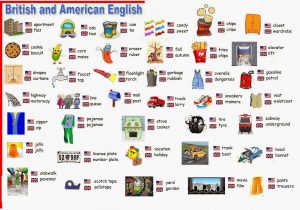 Spanish words became a part of our language.
Spanish words became a part of our language.
In 1923, the State of Illinois General Assembly, passed the act stating in part: “The official language of the State of Illinois shall be known hereafter as the “American” language and not as the “English” language.” A similar bill was also introduced in the U.S. House of Representatives the same year but died in committee. Now, after centuries of forming our “own” language, the English and American versions are once again beginning to blend as movies, songs, electronics, and global traveling bring the two “languages” closer together once again.
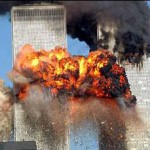 Fifteen years ago today, Americans were greeted with horror, as terrorism split the atmosphere of safety we had long enjoyed around our nation. I think most Americans had become comfortable, and even complacent about national security. Life was going along at almost a lazy Sunday afternoon pace. We were like small town kids, who thought that nothing ever happens in our town. How very wrong we were. Our world was about to be turned upside down.
Fifteen years ago today, Americans were greeted with horror, as terrorism split the atmosphere of safety we had long enjoyed around our nation. I think most Americans had become comfortable, and even complacent about national security. Life was going along at almost a lazy Sunday afternoon pace. We were like small town kids, who thought that nothing ever happens in our town. How very wrong we were. Our world was about to be turned upside down.
When the first plane hit the World Trade Center, I think most people thought it was a tragic accident. We simply couldn’t fathom the idea that a terrorist would be so horribly cruel as to hijack a plane full of innocent people and fly it straight into a building full of more innocent people. And yet, to our horror, that is exactly what these terrorists did. They operated the planes with no mercy and no feelings. They did not care about the lives they were taking or even about their own lives…in fact, they thought they were heroes for their actions, and that there would be great rewards in Heaven for them. Their complete shock as they entered Hell, must have been devastating.
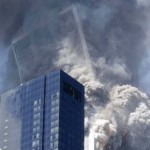 Their actions left our nation is shock and disbelief. We watch as the devastation unfolded before us, growing worse by the moment, our hearts and minds were assaulted, yet we could not look away. We watched, hoping that the people on the top floors could be saved…even after they began to fall or jump from the building, because the heat was more than they could take. We felt sick with each and every thud. We prayed over the rescuers, that they would be successful in getting people out, and that they would come out too. We watched in stunned disbelief as the towers fell, praying that after the first tower fell, that somehow, the second would remain standing…until it also fell. We became angry at the people who had done this, without provocation. Pure hate, of our beliefs, our prosperity, and our liberties, and that drove them to attack us.
Their actions left our nation is shock and disbelief. We watch as the devastation unfolded before us, growing worse by the moment, our hearts and minds were assaulted, yet we could not look away. We watched, hoping that the people on the top floors could be saved…even after they began to fall or jump from the building, because the heat was more than they could take. We felt sick with each and every thud. We prayed over the rescuers, that they would be successful in getting people out, and that they would come out too. We watched in stunned disbelief as the towers fell, praying that after the first tower fell, that somehow, the second would remain standing…until it also fell. We became angry at the people who had done this, without provocation. Pure hate, of our beliefs, our prosperity, and our liberties, and that drove them to attack us.
As the day went on, we watched in horror as more information came out. We knew that there were going to be 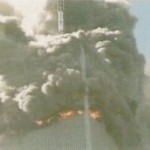 many people died, but still we watched as they dug through the rubble. We thought there would suddenly be people found alive in that rubble. As time went on, we knew that there wouldn’t be huge numbers of survivors. In the end, only twelve people were found alive after the towers fell. After a couple of days, we knew there would be no more, still we could not look away. We had to watch…had to know. As each lost one was found…we cried right along with their families. Then came the worst horror of all…finding out that some people would never be found. The fires had been so hot that their bodies were cremated. That added more horror to our thoughts. It was something we just couldn’t fathom, just like we could not fathom that 15 years later, that day would still be as vivid in our memories as it was on the day we were attacked.
many people died, but still we watched as they dug through the rubble. We thought there would suddenly be people found alive in that rubble. As time went on, we knew that there wouldn’t be huge numbers of survivors. In the end, only twelve people were found alive after the towers fell. After a couple of days, we knew there would be no more, still we could not look away. We had to watch…had to know. As each lost one was found…we cried right along with their families. Then came the worst horror of all…finding out that some people would never be found. The fires had been so hot that their bodies were cremated. That added more horror to our thoughts. It was something we just couldn’t fathom, just like we could not fathom that 15 years later, that day would still be as vivid in our memories as it was on the day we were attacked.
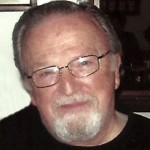 I’ve been spending some very enjoyable time emailing with my cousin, Dennis Fredrick lately, and the subject of Great Aunt Bertha Schumacher Hallgren’s journal came up again. That is all it takes for me to decide that I need to read it again. I can’t get over the draw that journal has on me. Every time I read it again, something more jumps out at me. Another little tidbit of her amazing personality, because you see, my Great Aunt Bertha was an amazing person. She had the ability to see things around her in a deeper and sometimes, different way than others. Her curious mind wondered about the events taking place, and their impact on the future. And she had a foresight that many people just don’t have. I love her vision.
I’ve been spending some very enjoyable time emailing with my cousin, Dennis Fredrick lately, and the subject of Great Aunt Bertha Schumacher Hallgren’s journal came up again. That is all it takes for me to decide that I need to read it again. I can’t get over the draw that journal has on me. Every time I read it again, something more jumps out at me. Another little tidbit of her amazing personality, because you see, my Great Aunt Bertha was an amazing person. She had the ability to see things around her in a deeper and sometimes, different way than others. Her curious mind wondered about the events taking place, and their impact on the future. And she had a foresight that many people just don’t have. I love her vision.
I didn’t get very far…the first page, in fact…before something new jumped out. She was talking about the dislike many people have of history, and how few want to write about it, except when it comes to family history. I think that is probably because they feel somehow connected to the events of the past, when they think about the fact that their ancestors lived those events. She talked about the idea of people writing about family histories taking off, and becoming a vast project that connected many people. She mentioned that, if writing about family history ever became popular to a wide scale, future generations could read about them centuries from now. Sometimes, I wonder what she would think of her idea of family history studies on a wide scale, because that is exactly what we have these days. Maybe, she could see a bit into the future, and in her mind envision events that were going to come about, much like Jules Verne did with some of his writings.
She encourages people to add to with family history, the human side, because without it, the history becomes dry reading of statistics with no heart to it. Great Aunt Bertha felt that we were living in amazing times at the time of her journal, and while many people would think she meant the 1800s, she did not. She was talking about 1980. I lived through the 1980s, and I can’t say that I ever felt like they were anything so special, but 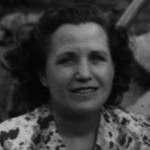 looking back now, I think about the man that many of us consider to be the greatest president we have ever had, Ronald Reagan. Those were days of recovery from the tense days of the 1970s and the big government we had then. They were days when taxes were cut, and government was limited, and things began to get better. The Cold War was winding down, and we saw the Berlin Wall come down at Reagan’s insistence. Thinking back I can see that Great Aunt Bertha was right. The 1980s were amazing days, but then so are many other times in our nation’s history. We just have to look at those days and realize that each generation has its greatness. That was the kind of thing my great aunt saw, but as I said, she saw deeper into a situation than most people saw, and she also saw the value of the insight she found by looking deeper.
looking back now, I think about the man that many of us consider to be the greatest president we have ever had, Ronald Reagan. Those were days of recovery from the tense days of the 1970s and the big government we had then. They were days when taxes were cut, and government was limited, and things began to get better. The Cold War was winding down, and we saw the Berlin Wall come down at Reagan’s insistence. Thinking back I can see that Great Aunt Bertha was right. The 1980s were amazing days, but then so are many other times in our nation’s history. We just have to look at those days and realize that each generation has its greatness. That was the kind of thing my great aunt saw, but as I said, she saw deeper into a situation than most people saw, and she also saw the value of the insight she found by looking deeper.
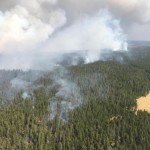
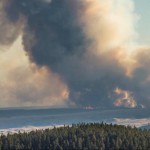 There is a fire burning in Yellowstone National Park. There are fires burning all over the western United States, as a matter of fact, but this particular fire bring back memories of the last big fire in Yellowstone National Park, and just how upset everyone was over the Let It Burn policy. Now, here we are again with a lightning caused fire burning in Yellowstone National Park, and no effort being made to fight it…unless structures end up being in danger of destruction.
There is a fire burning in Yellowstone National Park. There are fires burning all over the western United States, as a matter of fact, but this particular fire bring back memories of the last big fire in Yellowstone National Park, and just how upset everyone was over the Let It Burn policy. Now, here we are again with a lightning caused fire burning in Yellowstone National Park, and no effort being made to fight it…unless structures end up being in danger of destruction.
As with the 1988 fire, they tell us that the Natural Burn policy, another name for the Let It Burn policy, is in effect for this fire. The biggest problem with that policy is, of course, is that a fire burning unchecked can get so far out of control that it burns beyond human ability to put it out. It becomes an impossible task. That is what happened in 1988, and the whole nation was angry about it. In the end, that fire burned 1.2 million acres. Many people had the impression that the Park Service had failed badly. Nearly a third of Yellowstone National Park was badly burned. The Park Service said that the situation was inevitable because of the drought. Still, most people, me included, felt that if they had tried to fight it sooner, they could have saved a lot of the park from the hideous scarring damage it ended up with.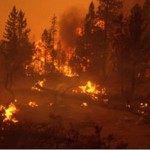
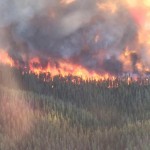
I understand that Yellowstone National Park has several fires each year, and that they usually burn themselves out in a short period of time, but in drought years, the Park Service simply can’t allow the fires to go. My concern with the current fire is that we are already at 2594 plus acres burned. How quickly is this fire going to get out of hand and how long before they will decide to do something about it?
The Yellowstone National Park fire of 1988 started in June and burned into November. It is a summer I will never forget. Our skies were constantly filled with smoke. The air stunk from the acrid smoke. It was hard for people to breathe. You couldn’t get away from it. I know this is how every person who lives in a fire area feels. I know I don’t have to explain this to anyone who has been around fires much. They already know more about wildfires than they ever wanted to.
The important thing for the government and the park service to remember is that the people of this nation love 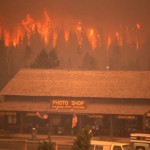
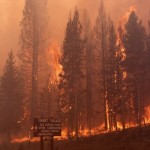 Yellowstone National Park, our oldest national park. It existed before the states where it is located were even states. I truly understand that fires are a natural part of the forest ecosystem, and that they get rid of dry brush that could bring about a worse fire, but I can’t see that it serves any good purpose to let 1.2 million acres of beautiful forest land burn and not even try to stop it. It destroys the homes of wildlife. It hurts the economy of the area it is in. All I ask is that the Park Service and the government remember just how important Yellowstone National Park is to the people of this nation.
Yellowstone National Park, our oldest national park. It existed before the states where it is located were even states. I truly understand that fires are a natural part of the forest ecosystem, and that they get rid of dry brush that could bring about a worse fire, but I can’t see that it serves any good purpose to let 1.2 million acres of beautiful forest land burn and not even try to stop it. It destroys the homes of wildlife. It hurts the economy of the area it is in. All I ask is that the Park Service and the government remember just how important Yellowstone National Park is to the people of this nation.
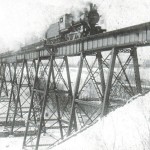 In their early years, the railroads were quite powerful companies, and with good reason. The railroad reduced travel time across the United States from days or months, to hours, in many cases. They brought supplies, payroll, and people from back east to the west quickly. The railroad did not come without some confusion, however. Even as late as the 1880s, most United States towns had their own system for keeping track of time, based on where the sun was at high noon. I had never given much thought to this, but I suppose it could have been a big mess, since the train’s arrival would be very mixed up, and the end result would be that the train might be scheduled to arrive in several places at once.
In their early years, the railroads were quite powerful companies, and with good reason. The railroad reduced travel time across the United States from days or months, to hours, in many cases. They brought supplies, payroll, and people from back east to the west quickly. The railroad did not come without some confusion, however. Even as late as the 1880s, most United States towns had their own system for keeping track of time, based on where the sun was at high noon. I had never given much thought to this, but I suppose it could have been a big mess, since the train’s arrival would be very mixed up, and the end result would be that the train might be scheduled to arrive in several places at once.
Because the railroads were quite powerful, they took it upon themselves to make a monumental change that would affect the entire nation, and Canada too. At exactly noon on this day in 1883, American and Canadian railroads broke the continent into four sections, and began using a system of time zones that we still use to this day, with very few changes made to it over the years. I’m sure there were people who did not like the new system much, but most people quickly embraced it, because their lives depended on the railroad in one way or another. The root of the problem they had was that they moved passengers and freight over the thousands of miles the line covered. With the varying times in towns along the route, the train 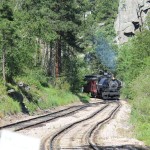 ended up with dozens of different departure and arrival times. No one really knew when the train would arrive…except possibly the engineer. I’m sure that caused chaos in the train stations…especially in the bigger cities. These days, we have to be at the airport two hours early for flights, because of screening, so imagine that kind of a scenario in the small train stations of the old west. This scheduling nightmare had to be stopped, and time zones were the only logical way to do it.
ended up with dozens of different departure and arrival times. No one really knew when the train would arrive…except possibly the engineer. I’m sure that caused chaos in the train stations…especially in the bigger cities. These days, we have to be at the airport two hours early for flights, because of screening, so imagine that kind of a scenario in the small train stations of the old west. This scheduling nightmare had to be stopped, and time zones were the only logical way to do it.
With the use of time zones, rail transportation became far more efficient. The thing that seems rather odd, is that they didn’t go to the United States or Canadian governments to resolve the problem, and if the government at that time was as inefficient as our congress is right now, I can fully understand why they didn’t. Imaging waiting six years to make a decision concerning time and its vital role in rail travel. Something had to be done right away, and the railroad was just bold enough to do it. As it turned out, no one tried to stop them either. I suppose everyone could see just how logical their plan was, and no one complained. So, the railroad companies agreed to create four continental time zones, and that decision has changed the way we live to this day.
The lines they adopted to make those time zones were very close to the ones we have today. I’m sure that any changes are based on where towns began to fall along the zone lines. It wasn’t until as late as 1918 that Congress officially adopted the railroad time zones and put them under the Interstate Commerce Commission. 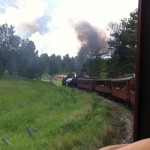 Just imagine, if you will, if the people and the railroad had waited for Congress to act on this matter. There would have been 35 more years of unorganized and frustrating railroad travel. Something that should have revolutionized travel, would have been relegated to the stone age again, because of Congress’ lack of action. Even after the system was implemented and people finally had an organized schedule, that was relatively accurate…because you can’t predict accidents or weather related delays very well, Congress sat on their hands, and I suppose they operated the government on government time instead. In this writer’s opinion, the time zones were a wonderful idea, and have benefitted this nation very well since 1883. My family has a long history of working on the railroad, and that is a fact that I am very proud of.
Just imagine, if you will, if the people and the railroad had waited for Congress to act on this matter. There would have been 35 more years of unorganized and frustrating railroad travel. Something that should have revolutionized travel, would have been relegated to the stone age again, because of Congress’ lack of action. Even after the system was implemented and people finally had an organized schedule, that was relatively accurate…because you can’t predict accidents or weather related delays very well, Congress sat on their hands, and I suppose they operated the government on government time instead. In this writer’s opinion, the time zones were a wonderful idea, and have benefitted this nation very well since 1883. My family has a long history of working on the railroad, and that is a fact that I am very proud of.
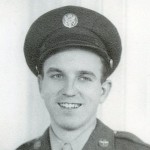 My children and grandchildren have always known that my dad fought in World War II, but I find that maybe they don’t fully know what his part was, or how I feel about it. That is not surprising when you think about the fact that my children, grandchildren, and indeed, even my sisters and I, were not even born when all that took place seventy years ago today. I am pleased that my grandchildren know that their great grandpa fought in World War II, because that tells me that we who are older and at least know about that time in history, have done our jobs, in teaching this youngest generation of our family about the history their family was involved in…pretty well anyway. I was also very proud of my grandson, Chris, because he was interested enough to ask the questions he did about his great grandpa’s service years.
My children and grandchildren have always known that my dad fought in World War II, but I find that maybe they don’t fully know what his part was, or how I feel about it. That is not surprising when you think about the fact that my children, grandchildren, and indeed, even my sisters and I, were not even born when all that took place seventy years ago today. I am pleased that my grandchildren know that their great grandpa fought in World War II, because that tells me that we who are older and at least know about that time in history, have done our jobs, in teaching this youngest generation of our family about the history their family was involved in…pretty well anyway. I was also very proud of my grandson, Chris, because he was interested enough to ask the questions he did about his great grandpa’s service years.
This morning, my grandson Chris sent me a text, tip toeing a bit, because he didn’t know how I 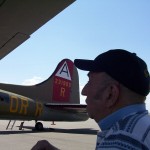 would feel talking about this part of me Dad’s life, and asked me if my dad was involved in the D-Day maneuvers. I immediately told him that I was very proud of the part my Dad had played in World War II, and that his squadron had provided air cover as the troops stormed the beaches of Normandy. I sent him the links to other stories I had written about my Dad’s World War II service years, and he was amazed at all his great grandpa had done. I know how he feels. The first time I was told about all the things my dad had done, I was amazed too…and very proud.
would feel talking about this part of me Dad’s life, and asked me if my dad was involved in the D-Day maneuvers. I immediately told him that I was very proud of the part my Dad had played in World War II, and that his squadron had provided air cover as the troops stormed the beaches of Normandy. I sent him the links to other stories I had written about my Dad’s World War II service years, and he was amazed at all his great grandpa had done. I know how he feels. The first time I was told about all the things my dad had done, I was amazed too…and very proud.
There are a number of men, and maybe even women, in our family who served their country in World War II, and were involved in D-Day maneuvers, and each one is a hero in my eyes. This was such an important day in our history, as was the war it was a part of, and I would hate to think that our grandchildren and great grandchildren would never know of the sacrifice those brave men  made. I would hate to think that the heroes of this and other wars would be forgotten by a nation too busy with their own lives and interests to take the time to look back in history and see for themselves exactly what took place. I know many people find history to be dull, dry, and boring in school, but as we age, and experience a few wars, weather events, earthquakes, and other changes in our nation, we realize that maybe we really need to take a look back and see just how we came to be the great nation we are…and remember the sacrifices made by so many to get us where we are today. I want to thank all the men and women who took part in D-Day, World War II, and all the other wars our nation has been a part of. We are great because of God and you!!
made. I would hate to think that the heroes of this and other wars would be forgotten by a nation too busy with their own lives and interests to take the time to look back in history and see for themselves exactly what took place. I know many people find history to be dull, dry, and boring in school, but as we age, and experience a few wars, weather events, earthquakes, and other changes in our nation, we realize that maybe we really need to take a look back and see just how we came to be the great nation we are…and remember the sacrifices made by so many to get us where we are today. I want to thank all the men and women who took part in D-Day, World War II, and all the other wars our nation has been a part of. We are great because of God and you!!
 Memorial Day…a day for remembering the fallen soldiers, began after the Civil War, which has laid claim to the most war dead in any war in history. Most people don’t know that. When you think about the fact that so many of the fallen soldiers in the Civil War died gruesome deaths, torn to pieces by cannon balls or musket guns. Medical care was minimal, at best and nonexistent in many cases. There were no dog tags or DNA testing, so many of the soldiers killed were never identified. They died without dignity, after giving their live so nobly in the fight for freedom.
Memorial Day…a day for remembering the fallen soldiers, began after the Civil War, which has laid claim to the most war dead in any war in history. Most people don’t know that. When you think about the fact that so many of the fallen soldiers in the Civil War died gruesome deaths, torn to pieces by cannon balls or musket guns. Medical care was minimal, at best and nonexistent in many cases. There were no dog tags or DNA testing, so many of the soldiers killed were never identified. They died without dignity, after giving their live so nobly in the fight for freedom.
Ours was a nation in mourning, with no way to fully express the depth of its feelings. Originally called Decoration Day, this day was set aside as a day to decorate the graves of war dead, giving them the honor and dignity they did not have at the time of their death.
Since its inception on May 5, 1867, Memorial Day, as it is now called, has changed in many ways. Many people simply think of it as a day off from work…a good day to party or gather for picnics with friends and family. They forget that since the Civil War, our nation has been 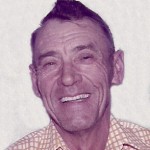 involved in many wars and police actions, as they have been called since World War II. People notoriously try to block out those things that make them feel uncomfortable. Sad…that we could so easily forget the sacrifices that have been made to give them the freedom to choose not to honor the men who fought to give them that freedom. Sad that we could be so quick to forget.
involved in many wars and police actions, as they have been called since World War II. People notoriously try to block out those things that make them feel uncomfortable. Sad…that we could so easily forget the sacrifices that have been made to give them the freedom to choose not to honor the men who fought to give them that freedom. Sad that we could be so quick to forget.
Today, those of us who celebrate Memorial Day as Decoration Day have also added our loved ones who are not veterans, and I believe that is fitting too. So, for me, I honor my dad, my father-in-law, nieces, aunt, uncles, grandparents, and cousins who have gone before me. I love you all.
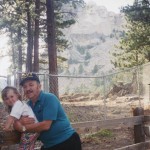 My dad loved pretty much everything that had to do with history. I suppose that is why we stopped at every historical marker or historical site we found. Dad wanted his kids and grandkids to know as much about our nation’s history is he could show us. He wanted us to know where this nation came from, how it progressed, and what it had accomplished…what our ancestors and the ancestors of others had accomplished. From the founding fathers who started this country, formed it ideals and its government, to the days of the horse and buggy when the pioneers began to head west, looking for their fortune and a place to put down roots. He loved the old west.
My dad loved pretty much everything that had to do with history. I suppose that is why we stopped at every historical marker or historical site we found. Dad wanted his kids and grandkids to know as much about our nation’s history is he could show us. He wanted us to know where this nation came from, how it progressed, and what it had accomplished…what our ancestors and the ancestors of others had accomplished. From the founding fathers who started this country, formed it ideals and its government, to the days of the horse and buggy when the pioneers began to head west, looking for their fortune and a place to put down roots. He loved the old west.
He showed us so many aspects of history, that we almost felt like we were there. I 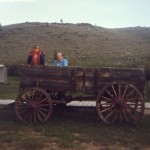 sometimes wondered how he could have possibly known so much about things from the past. Of course, now I know that some things were taught or passed down, and many things he read about. He simply absorbed the information. And he also had a flair for story telling, so he often made history seem like he had actually lived it. These are stories and places I will never forget, although I’m sure I didn’t completely appreciate all of it like I should have, but I guess most kids wouldn’t have.
sometimes wondered how he could have possibly known so much about things from the past. Of course, now I know that some things were taught or passed down, and many things he read about. He simply absorbed the information. And he also had a flair for story telling, so he often made history seem like he had actually lived it. These are stories and places I will never forget, although I’m sure I didn’t completely appreciate all of it like I should have, but I guess most kids wouldn’t have.
My dad was very patriotic and loved his country. I suppose that is one reason he loved the Black Hills so much. There was so much history there, and so much information. Just spending a little time listening to one of the many speakers at Mount Rushmore, can open a bounty of information. To this day, I can’t go to Mount Rushmore 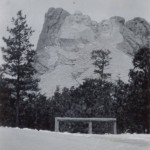 without feeling a sense of awe. There is a need to show respect to the memory of those great presidents. Almost a need to be very quiet…or at the very least, whisper. Kind of a show of respect.
without feeling a sense of awe. There is a need to show respect to the memory of those great presidents. Almost a need to be very quiet…or at the very least, whisper. Kind of a show of respect.
I think that must have been how Dad felt whe he visited Mount Rushmore in his younger years, because he took lots of pictures and kept them safe all those years. I think he knew it was a special place full of history, the kind of place he might want to show his family some day. The kind of place he might want to come back to and share with his kids. So we could learn from it the way he did.

